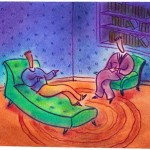Beating the Blues is a computer based interactive programme for the treatment of anxiety and depression. It is based on Cognitive Behavioural Therapy (CBT), which helps patients to identify and change unhelpful ways of thinking and to learn more effective ways of solving problems.
Tim Lott writes in today’s Guardian about  this computer cognitive behaviour therapy progam prescribed by the NHS in an attempt to meet the growing demand for cost effective mental health treatment. Link to continue reading
Obviously, being schooled by a computer has its drawbacks – you can’t ask in the course of therapeutic conversation about anything you don’t understand, and you often end up dealing with territory that isn’t relevant to you.
Most people with depression need some kind of therapy but can a computer replace face to face counselling with a therapist? We’d be interested to hear your thoughts on this
Source: The Guardian
Published: March 26, 2009

Image credit: Getty Images
The BPS Research Digest takes a look at CBT. Glen Waller looks at why behavioural therapy (CBT), it doesn’t always seem to work with some therapists.
The biggest single problem, according to Waller, is that real life clinicians often fail to deliver proper CBT with all its active ingredients. For example, one of the most important aspects of CBT is behavioural change, yet clinicians often shy away from encouraging clients to adopt the changes they need to make, especially when such changes are likely to provoke increased anxiety in the short term. link to continue reading
Source: BPS Research Digest
Waller, G. (2009). Evidence-based treatment and therapist drift. Behaviour Research and Therapy, 47 (2), 119-127 DOI: 10.1016/j.brat.2008.10.018
Published: August 12, 2008
 Cognitive behaviour therapy may fail if the client believes their therapist is responsible for the outcome. This is the finding of a study published today (11 August 2008) in the British Journal of Clinical Psychology.
Cognitive behaviour therapy may fail if the client believes their therapist is responsible for the outcome. This is the finding of a study published today (11 August 2008) in the British Journal of Clinical Psychology.
This study looked at the success rate of group cognitive behaviour therapy (CBT) for 49 individuals suffering from social anxiety disorder, and compared this to each patient’s expectancies about the therapy. [continue reading…]
Published: September 18, 2007
Junk medicine, I think this might work
Mark Henderson
Cognitive behavioural therapy (CBT), which seeks to improve the symptoms of illness by changing patients’ attitudes, thoughts and feelings, often strikes people as flaky. It sometimes seems to suggest the power of mind over matter, chiming both with New Age ideas that a healthy body flows from a healthy spirit and the old-fashioned “pull yourself together” approach to psychiatric medicine. Link to read the rest of this Times article published on Sept 15, 2007 [continue reading…]

